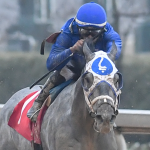
Preakness Quick Sheet: Get to Know the 2021 Preakness Horses

Latinos are everywhere in Thoroughbred racing.
Look at every farm, track, jockey colony, and sales pavilion. They are people whose influence on the industry oftentimes goes unnoticed or worse, unappreciated.
But when Mage surged ahead in the final moments of the Kentucky Derby Presented by Woodford Reserve, he did more than win the most recognizable Thoroughbred race in the world. He brought to the forefront the connections who had something in common — something different than what the sport is used to seeing in the winner’s circle. They weren’t white.
There is the Hall of Fame jockey from Venezuela, the trainer and assistant trainer — a father and son duo — also from Venezuela. And then there is the co-owner whose family immigrated from Colombia.
In that moment, as 150,335 fans rained down cheers at Churchill Downs, there may have begun a shift in the sport’s landscape that the magnitude of which won’t likely be felt for a generation or two.
Ramiro Restrepo, who co-owns Mage, may have become the face of Latinos in the sport. What becomes of that remains to be seen. But winning the May 20 Preakness Stakes at Pimlico might just escalate the spark lit in Louisville into a blaze.
This is not a notion he entertains. He is too humble, too focused on the next goal to check off.
Don’t let there be any confusion. Restrepo knows he walks in the footsteps of so many who have come before him.
“Those of Latin American descent or first- and second- or native-born have always had a big impact as trainers, as jockeys; [they] have worked really hard for many, many, many years. As far as I can remember you could hear the name Pancho Martin and Lazaro Barrera. You know how amazing they were, what they did, and Hall of Famers in their own right. So the bar has been set high for those of our background,” Restrepo said prior to the Preakness draw. “But in recent times, you know, the game has gotten a little older, and at the same time being someone in his 40s that can represent the culture, there’s a lot of pride there.”

That pride is key. Restrepo’s inheritance in the sport was working from the ground up. He wasn’t handed anything other than a water bucket. Now Restrepo is carrying the banner for not just the Hall of Fame trainers and jockeys such as Javier Castellano, who rode Mage in the Derby. He’s doing it for the grooms, the hotwalkers; for the families whose dedication and determination put horses in a position to succeed.
And here he thought his role with Fasig-Tipton as a South Florida field representative in which he cultivates relationships in Latin America, the Caribbean, and South America was big. To have a sales company want someone who represented those countries and develop ties there was a mountain in its own right. He knew then “there would be another stratosphere for everyone,” he said.
He wasn’t wrong.
Hear this out: Could there be someone doing the work so many believe to be beneath them and in the process fall in love with the horses, the sport, and its majesty? And could that someone decide he or she wants to make a living in the sport — not by cleaning out stalls but by training horses? What about owning horses?
Is it such an outlandish proposition to believe?
It shouldn’t be. That’s what happened to Restrepo, whose family’s ties to the sport go back generations. What if Restrepo is someone’s lightning rod the way Martin and Barrera were for him?
Gonçalo Borges Torrealba, the chairman of Three Chimneys, said that he has followed the moves Restrepo has made in the industry over the past few years. In an email he wrote, “It seems to me he has a very good eye for a horse and is putting his money where his mouth is. I am very proud of the South American connections’ success in America’s race.”
He added, “Hope this example will inspire more talents to fly north and show their abilities.”
Dr. Oscar Benavides, who owns Montesacro Farm in Georgetown, Ky., said that the goals of so many who left his native Venezuela for the United States and invested in the sport were accomplished when Mage crossed the finish line. They wanted to see people who look like them reach the pinnacle.
“We are all very happy with the goal accomplished. We’ve waited for years after Canonero II’s race in 1971,” he said.
While the need exists to find more Latinos willing to invest time and money in the sport, Benavides said Mage’s win will “help our image in the business.”
The impact today might appear small. Maybe it’s a dream. Maybe it’s a phone call to better understand what the commitment would be. Whatever it is, whatever shape it takes, it’s real.
“It means a lot. Especially because I think it’s a good message for our community. Anybody can do it if they have the will to pursue whatever they want,” said Mage’s assistant trainer Gustavo Delgado Jr.
Being successful in any facet of the game is a remarkable accomplishment. The odds are stacked against anyone who tries. Finding the right blend of skill, talent, drive, and of course, resources is like a winning lottery ticket. But perhaps Restrepo’s story and achievements change the direction of someone’s life. In the process that changes Thoroughbred racing.

Restrepo is bilingual, camera-friendly, and candid. He’s far from cookie-cutter material. The sport could benefit from a few more made from his cloth.
Since the Derby win, media outlets from across Latin America have wanted to tell Mage’s story, Restrepo’s story. As that word spreads, there is no telling how it will take off.
“You want to provide as much of an example that your possibilities are endless as long as you have the passion,” Restrepo said.
Restrepo is a historian of the game. He was born in 1978, the same year Affirmed won the Triple Crown. There was a connection for him with the horses he watched growing up. Just as he watched basketball legends such as Michael Jordan, Larry Bird, and Magic Johnson, Restrepo knew when he was seeing something special.
Now the reality is that he is forever linked to something special, a moment in time that could have far greater consequences than anticipated. There is a chapter of the sport’s history that he’ll forever be part of. And Saturday he may write another—one that elevates Latinos even higher.
“It would be an honor to be considered representative of that and just to be a positive steward,” he said.

Please fill out the form below to request information about race horse ownership.